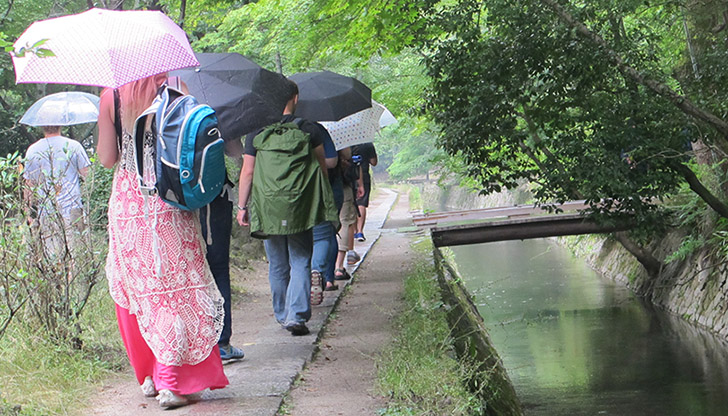Theology, Filmmaking, and Social Justice Immersion
Introduction
Several years ago, I, with two of my colleagues here at Creighton University in Omaha, Nebraska, created a program called The Backpack Journalism Project. A collaboration between the Department of Theology and the Department of Journalism, Media, and Computing, this program uses the tool of documentary filmmaking to educate undergraduate students about the challenges facing people in the developing world and marginalized societies.1 To date, our project has produced four short documentary films, one set in the Dominican Republic, two set in Uganda, and one set in Bethel, Alaska.
In our first film, Esperanza, we profiled the work of Pedro Pena, a Catholic deacon who works in the heart of the worst slum in Santiago, Dominican Republic. The slum is built around and on top of a city dump. Pena labors to improve the health and education of local residents.
The second and third film projects are set in Northern Uganda. Both of these films explore some aspect of the legacy of violence. Mato Oput portrays local efforts to forgive former child soldiers and to reintegrate them into the community. Wer Uganda is a film about the healing role of music in the traditional culture of the region. Mato Oput screened in several film festivals in the United States and was awarded Best Picture at the Re-Image Film Festival in 2012.
Our most recent film, Mother Kuskokwim, considers the impact of climate change and economic hardship on the Yup’ik people of Southwestern Alaska. This film is currently making its way through the film festival circuit and has been accepted to four festivals at the time of this writing.
Theory and Strategy
Creighton is a Jesuit and Catholic university, and the Backpack Journalism Project is best understood as a product of this context. Beginning with the leadership of Pedro Arrupe, who became Superior General of the Jesuits in 1965, the global Society of Jesus committed itself more deeply to serving those at the margins of modern society. As a part of this effort, the Jesuit order has encouraged all of their affiliated institutions around the world to attempt similar engagement.
Of special relevance for our project is language that appears in the decrees of the 35th General Congregation of the Jesuits, which took place in 2008. In decree 3, paragraph 29, we encounter an invitation and a challenge:
Among the defining characteristics of our globalized world are new communications technologies. They have a tremendous impact on all of us, especially the young. They can be powerful instruments for building and supporting international networks, in our advocacy, in our work of education, and in our sharing of our spirituality and our faith. This Congregation urges Jesuit institutions to put these new technologies at the service of those at the margins.2
The Backpack Journalism Project is one response to this invitation.
The program is structured around a five-week intensive summer immersion experience. Students receive six core credits (in theology and journalism) for their efforts. We require no prior experience in filmmaking, and we welcome students from any major.
The five weeks unfold as follows. In week one, the students meet all day to receive intensive instruction in video shooting, interview techniques, and video editing. In addition, they receive lectures in ecclesiology and journalistic storytelling. In weeks two through four, we travel to our destination and shoot the film. The topic of the film, as well as most of the key interviews, is arranged in advance by the instructors. However, these plans often change as the project unfolds, and the students assist in making necessary adjustments to the production schedule. Before returning to Omaha, we spend a few days traveling as tourists rather than working as filmmakers. The final days of the project are dedicated to creating a “rough cut” of the film, which is finished later by the faculty and student volunteers. Along the way, students also complete all related academic assignments.
This program is an intense experience for both students and faculty. Not only are we working very hard to do a good job, but we are together all the time and wrestling with the reality of global poverty. Most students are deeply challenged by this reality, and we want them to be. However, we also recognize that students need help processing the encounter. In order to facilitate this, we rely upon the principles of Ignatian Pedagogy, which stress helping students connect the dots between academic content and their own experiences. Ignatian Pedagogy, with its emphasis on developing quality educational experiences for students and encouraging reflection, action, and evaluation of those learning experiences, is a tool that helps to facilitate intellectual, moral, and spiritual growth.3
Conclusion
The Backpack Journalism Project is designed to invite our students to wake up to their own privilege and, in so waking, become more engaged with the needs of the world. To help facilitate this shift in perspective, we meet before, during, and after the trip for reflection and discussion.
We remind the students that the goal of this project is to tell the stories we encounter with as much reverence and respect as we can, not to parachute in with life-changing solutions to global problems. While we genuinely hope telling these stories will in some way assist the people and communities who receive us, we also remind the students that we are going to receive more than we give and that we need to receive this gift with humility and thanks. The following comments from students who participated in our latest project suggest that they have accepted well this invitation:
"The Backpack Journalism Project has been the most incredible experience of my college career. While I learned so much during the entire program, the most powerful aspect of the trip to Alaska was hearing the stories of the Yup’ik people and how climate change is threatening their way of life. Being in this vulnerable part of the world has reminded me to be conscious of my actions, both big and small. I am thankful to be able to share our documentary with others and give a voice to the people of Bethel.”
"Participating in the Backpack Journalism trip, particularly our experiences in Alaska, really taught me a lot about global impact. When you visit another place that is experiencing the negative side effects of others' actions, it really makes you step back and reevaluate your own life choices."
"Visiting Alaska has taught me more about myself and my place in the world, and the consequential impact, whether it is positive or negative, that I can have on it."
I have been teaching undergraduates for twenty-two years, and this is one of the most satisfying pedagogical experiences I have had in my career. Although it is extremely labor intensive, I have emerged from each of our projects with deeper commitment to Jesuit liberal arts education. It can, and often does, change lives.
Notes
1 ^ For a more detailed discussion of the goals of the Backpack Journalism Project see, O’Keefe, John J. 2012. “God Through the Camera Frame: Backpack Journalism and the Catholic Imagination.” In Religion and the Visual, edited by Ronald A. Simkins and Wendy M. Wright, 154–166. Omaha, NE: The Kripke Center. http://moses.creighton.edu/jrs/2012/2012-12.pdf. For more information about the idea of “Backpack Journalism,” visit the blog of Bill Gentile, one of the first backpack journalists: http://billgentile.com/backpackjournalism/
2 ^ The official Decrees of General Congregations 35 are available at: http://onlineministries.creighton.edu/CollaborativeMinistry/GC35/
3 ^ A useful summary of the principles of Ignatian Pedagogy can be found on the website of Xavier University: http://www.xavier.edu/jesuitresource/ignatian-resources/jesuit-education-ignatian-pedagogy.cfm
Resources
For two thoughtful reflections on the dangers of doing “service” abroad, see Van Engen, JoAnn. 2000. “The Cost of Short-Term Missions.” The Other Side 36 (January–February): 20–30.
 John J. O'Keefe, PhD, is a professor of theology and the holder of the A. F. Jacobson Chair in Communication at Creighton University. His academic research has focused on the history and theology of ancient Christianity, especially in the area of ancient interpretation of the Bible. He is currently interested in early Christian theologies of nature and the Christian theological contribution to the environmental movement. He is also the founding director of the Center for Catholic Thought at Creighton University. As the holder of the Jacobson Chair, O’Keefe is involved in documentary filmmaking projects that explore the mission of the Church in the developing world. O’Keefe received his MTS from Weston Jesuit School of Theology in 1987, and his MA and PhD in early Christian studies from The Catholic University of America in 1990 and 1993. He joined the faculty of Creighton University in 1992. O'Keefe is married and has four grown children.
John J. O'Keefe, PhD, is a professor of theology and the holder of the A. F. Jacobson Chair in Communication at Creighton University. His academic research has focused on the history and theology of ancient Christianity, especially in the area of ancient interpretation of the Bible. He is currently interested in early Christian theologies of nature and the Christian theological contribution to the environmental movement. He is also the founding director of the Center for Catholic Thought at Creighton University. As the holder of the Jacobson Chair, O’Keefe is involved in documentary filmmaking projects that explore the mission of the Church in the developing world. O’Keefe received his MTS from Weston Jesuit School of Theology in 1987, and his MA and PhD in early Christian studies from The Catholic University of America in 1990 and 1993. He joined the faculty of Creighton University in 1992. O'Keefe is married and has four grown children.
Image: West Virginia University 2014 Study Abroad Students. Tetsugaku-no-Michi, Kyoto, Japan, 2014. Photo Credit: Alex Snow

